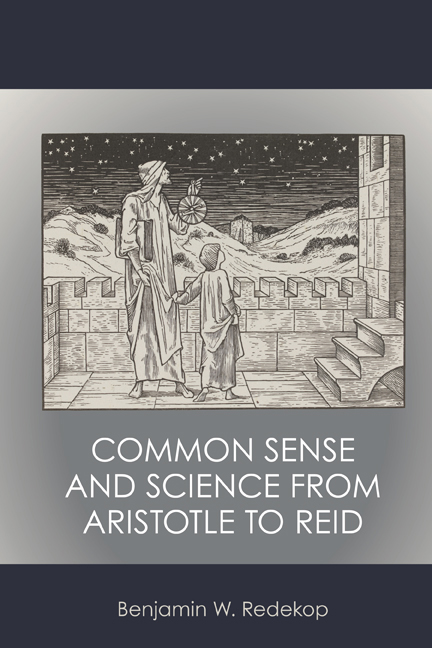Book contents
- Frontmatter
- Contents
- Acknowledgments
- Introduction
- 1 Common Sense and Scientific Thinking before Copernicus
- 2 The Challenge of Modern Science and Philosophy
- 3 Common Notions, Sens Commun: Herbert of Cherbury and Renè Descartes
- 4 Hobbes, Locke, and Innatist Responses to Skepticism and Materialism
- 5 Common Sense in Early Eighteenth-Century Thought
- 6 Common Sense and Moral Sense: Buffier, Hutcheson, and Butler
- 7 Common Sense and the Science of Man in Enlightenment Scotland: Turnbull and Kames
- 8 Common Sense, Science, and the Public Sphere: The Philosophy of Thomas Reid
- Epilogue
- Notes
- Index
6 - Common Sense and Moral Sense: Buffier, Hutcheson, and Butler
Published online by Cambridge University Press: 07 November 2020
- Frontmatter
- Contents
- Acknowledgments
- Introduction
- 1 Common Sense and Scientific Thinking before Copernicus
- 2 The Challenge of Modern Science and Philosophy
- 3 Common Notions, Sens Commun: Herbert of Cherbury and Renè Descartes
- 4 Hobbes, Locke, and Innatist Responses to Skepticism and Materialism
- 5 Common Sense in Early Eighteenth-Century Thought
- 6 Common Sense and Moral Sense: Buffier, Hutcheson, and Butler
- 7 Common Sense and the Science of Man in Enlightenment Scotland: Turnbull and Kames
- 8 Common Sense, Science, and the Public Sphere: The Philosophy of Thomas Reid
- Epilogue
- Notes
- Index
Summary
The French Jesuit scholar Claude Buffier (1661–1737) was the first modern thinker to develop a fully fledged philosophical doctrine of common sense (sens comun). In his philosophical writings, Buffier sought to shore up connections between the human mind and the external world that had been left tenuous by Descartes and Locke. The inherent skepticism and idealism of modern philosophy did not square with the rough and ready perceptions of the average person, and Buffier sought to ground higher thought in common-sense experience.
Like most common-sense philosophers who followed after him, Buffier was an educator, and consequently he was very responsive to the growth in literacy and the rise of a modern public sphere of enlightened discourse that was in principle open to everyone. As a young man he taught courses in the humanities, and after joining the Jesuit order in 1695 he became a full-time man of letters who published popular works of history, philosophy, religion, geography, ethics, grammar, and logic, culminating in his 1732 Cours de sciences, a complete course of studies for youth. He was a sociable figure who moved in aristocratic circles and attended fashionable salons, yet he remained at heart a popularizer who aimed to make higher learning accessible to the average person. Buffier spearheaded the trend in Jesuit education toward studying history and geography as independent subjects, and his widely adopted textbook on French grammar helped to focus more attention on the vernacular. Buffier, who frequented the salon of the feminist Marquise de Lambert, was also a supporter of female education, arguing that women are as intelligent as men. He has thus been seen as “a radical and reforming element within the structure of Jesuit education.”
Buffier was a scriptor (scholar/ writer) at the intellectually vibrant Collége Louis-le-Grand in Paris from 1701 until his death in 1737, and he was a founding editor of the Mémoires de Trévoux, a cosmopolitan journal that featured articles and reviews on a variety of learned topics, written mainly by Jesuits but also by other members of the European Republic of Letters, including Leibniz.
Information
- Type
- Chapter
- Information
- Common Sense and Science from Aristotle to Reid , pp. 77 - 92Publisher: Anthem PressPrint publication year: 2020
